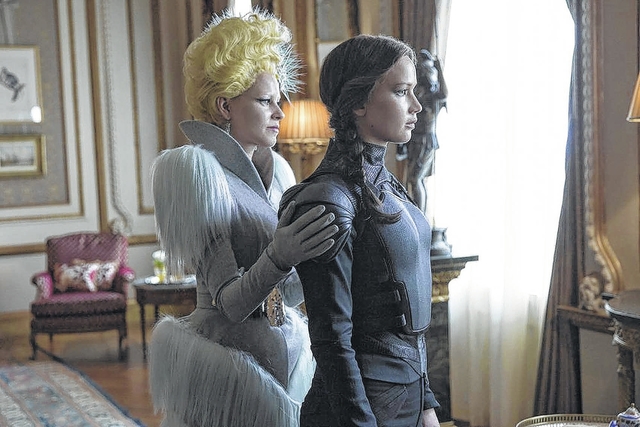I always appreciate when a movie is bleak or pessimistic because movies don’t have to be bleak or pessimistic. Movies aren’t required to reflect the ever-present miseries of day-to-day life. In fact, movies needn’t be anything more than feel-good parables involving The Hulk, talking snowmen or Tim Allen comically bonking his head off kitchen cabinets. To “The Hunger Games’” credit, it’s very bleak and extremely pessimistic.
“The Hunger Games: Mockingjay, Part 2” is such a dour, little black rain cloud of a movie that the moment where Jennifer Lawrence gently coos to a newborn that life stinks and it’s only going to get worse qualifies as the only life-affirming or ‘sweet’ element you’ll find in this movie. “The Hunger Games: Mockingjay, Part 2” is probably the only film more depressing than Werner Herzog’s “Stroszek” and that movie ended with a man killing himself on a ski-lift as a chicken pecks at the keys on a toy piano. But as much as “Mockingjay: Part 2’s” cynicism touched my inner nihilist, it’s also the kind of superficial pessimism favored by Christopher Nolan and anyone who’s ever described the human race as sheeple or owned a T-shirt that read, “I See Dumb People.” It would be moronic to label a film based on a young adult novel as juvenile but “Mockingjay: Part 2” is too dumb to be as self-important as it is. How am I supposed to take its themes about the inherent corruption in absolute power and the questionable morality of war seriously when it’s realized by characters with names like Plutarch Heavensbee, Caesar Flickerman and Apollonia Sprinklecricket (One of these ridiculously stupid names I just made up with right now. Can you guess which)?
I realize I note this every time I write a review of any given film adaptation of some young adult novel, but could we please have a ‘previously on’-style recap of the events in the preceding movie? Granted, nobody would willingly step into a movie with the words “Part 2” attached to the title without seeing “Part 1,” but some of us aren’t here willingly.
Additionally, I’ve seen so many of these same-y, young adult dystopia-fests I can’t keep them straight. Is this the one with the maze-running? The one where Kate Winslet is shot after she struggles with an American accent? Are there womping willows in this? I’m not invested in this garbage. Remind me again as to what I’m watching and why.
At any rate, Mockingjay, Part 2 picks up immediately where Part 1 left off with Katniss Everdeen (Lawrence) recovering from the injuries she sustained from dystopian “nice guy” Peeta Mellark (Josh Hutcherson) presumably after she totally friend-zoned him for some complete Chad (Liam Hemsworth).
Ugh. I hate Peeta. You just know someone this needy and unappealing is rocking some apocalyptic fedora in his dystopian Facebook profile (one probably made out of aluminum and the remnants of a swan’s ass).
From there, Katniss and “The Hunger Games” gang (which, on the plus side, does include character actor Elden Henson and Natalie Dormer) slowly venture across Panem to murder President Snow (Donald Sutherland) once and for all. Along the way they shoot all kinds of arrows at C.H.U.D.s, lakes of tar and Julianne Moore. After seemingly hours of scenes in which sad-faced people slowly traipse through sewers and gray, Eastern European cities, a helpful tiger lady appears for no particular reason. Eventually Katniss screams at a confused cat in a filthy abandoned kitchen and the film stumbles to a close. We can all go home.
Sort of functioning as a junior varsity “Hobbit” in terms of gratuitous padding and unhurried pacing, Mockingjay, Part 2 is a sleep-inducing slog mainly because the more interesting characters from the franchise (and the interesting actors who portray them) are relegated to the sidelines as the film almost exclusively focuses on Katniss (who still comes off as an ill-defined Bella Swan-like audience surrogate even though she’s played by the talented Lawrence) and Peeta (who has literally and figuratively dragged down the characters throughout this series) and their very unlikely romance. Additionally, the film’s politics are muddled. Katniss takes her fellow soldiers to task for slaughtering innocent civilians but later on has no moral quandary with firing her arrows wildly into a crowd of innocent civilians.
Like “The Matrix” franchise, “The Hunger Games” series will not age well. Five years from now its fans will not look at these films with fondness, but with a cringe as they drop off a box of “Mockingjay” DVDs, Burger King glasses and plush Stanley Tucci dolls on the doorstep of their local Salvation Army.




